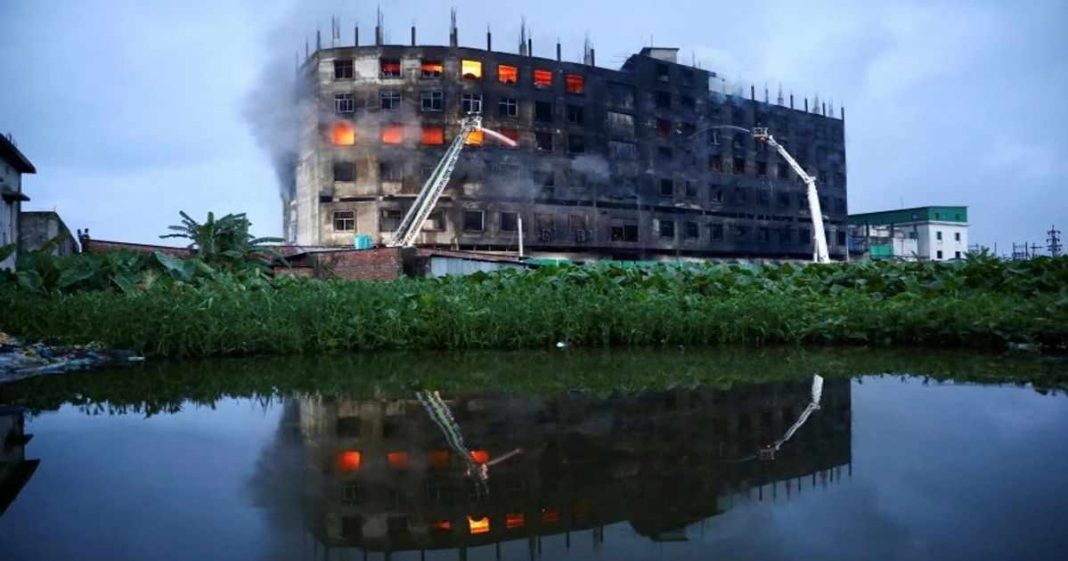The foreign office of Pakistan has expressed its sorrow and offered condolences to the innocent lives lost in a factory fire in Dhaka, Bangladesh.
The unfortunate event took place at 5 pm on Thursday 8th July in the five-story Hashem Food and Beverages Ltd. Factory located in Rubganj, near Dhaka.
The Ministry of Foreign Affairs (MOFA) spokesperson Zahid Hafeez Chaudhry tweeted on the matter and sent prayers for the injured and their affected loved ones.
Deeply saddened by the loss of precious lives due to a factory fire in Bangladesh. Heartfelt condolences to the families of the victims, the government and the brotherly people of Bangladesh. We pray for quick recovery of those injured.
— Ministry of Foreign Affairs – Pakistan (@ForeignOfficePk) July 9, 2021
As 24 hours have passed since the incident took place, the details of the incident are still developing as the rescue operation is underway. So far, 49 people have lost their lives and dozens of others are severely injured, while many have suffered 3rd-degree burns.
The accurate number of people inside the building is still not known, however, many of those that escaped the fire claim that dozens of workers are trapped in the factory as the only emergency exit was locked from inside.
Read more: ATC sentences MQM’s Rehman ‘Bhola’, Zubair ‘Charya’ to death in Baldia factory fire case
Some escaped by jumping from the upper floors, others are still hoping to be rescued.
The fire service spokesperson Debashish Bardhan said that once the fire is completely extinguished and the situation is under control, only then a search and rescue operation can be conducted to estimate the damage caused by the event.
Factory workers, fires, and frauds
This is not the first incident of its kind taking place in Bangladesh. Due to the lax enforcement of safety and protection laws in South Asia, such fires often expose the reality of low wage workers in developing countries and the deadly cost of ‘fast fashion’.
Just last year, in February, 70 people died when a fire broke in apartment blocks in Dhaka.
Similarly, in November 2012, a fire in the Tazreen Fashion Factory claimed the lives of at least 112 workers due to a short circuit on the ground floor that rapidly spread up to nine floors where most workers were trapped in the narrow fire exits.
The same year, five months later, Rana Plaza Building collapsed taking with it 1134 lives. The plaza was an eight-story commercial building that produced garments on its upper floors. The building was evacuated after cracks were identified, however, the factory workers were forced to come back to work in order to meet client deadlines.
Read more: Worst building disasters in Bangladesh
After such horrid incidents, initiatives have been taken to improve the conditions of factories and factory workers. The 2013 Accord on Fire and Building Safety in Bangladesh was created as a legally binding agreement between brands and trade unions to ensure a safe and secure working environment for garment and textile workers in the country.
This law instituted measures to inspect buildings and factories and upgrade and/or shut down the buildings that seemed unsafe or dangerous for the lives of the workers.
However, not enough is being done to prevent such accidents from happening. Companies invest in ways to use the loopholes to bypass the laws implemented as no accountability is ensured by the government.
Pakistan is no stranger to such horrible tragedies caused by pure neglect of administration. One prominent event is the event from 11 September 2012, when a factory by the name of Ali Enterprise went ablaze in the Baldia Town area in Karachi. 264 people lost their lives while many others were injured or disabled for life.
Read more: Baldia Factory Fire Case: Owner Accuses MQM Lawmaker Rauf Siddiqui and Six others
In order to overcome such accidents and mishaps, there is a dire need for strict laws that are not only legislated but are also implemented to ensure a better environment for the working-class labor that runs a country’s economy.














